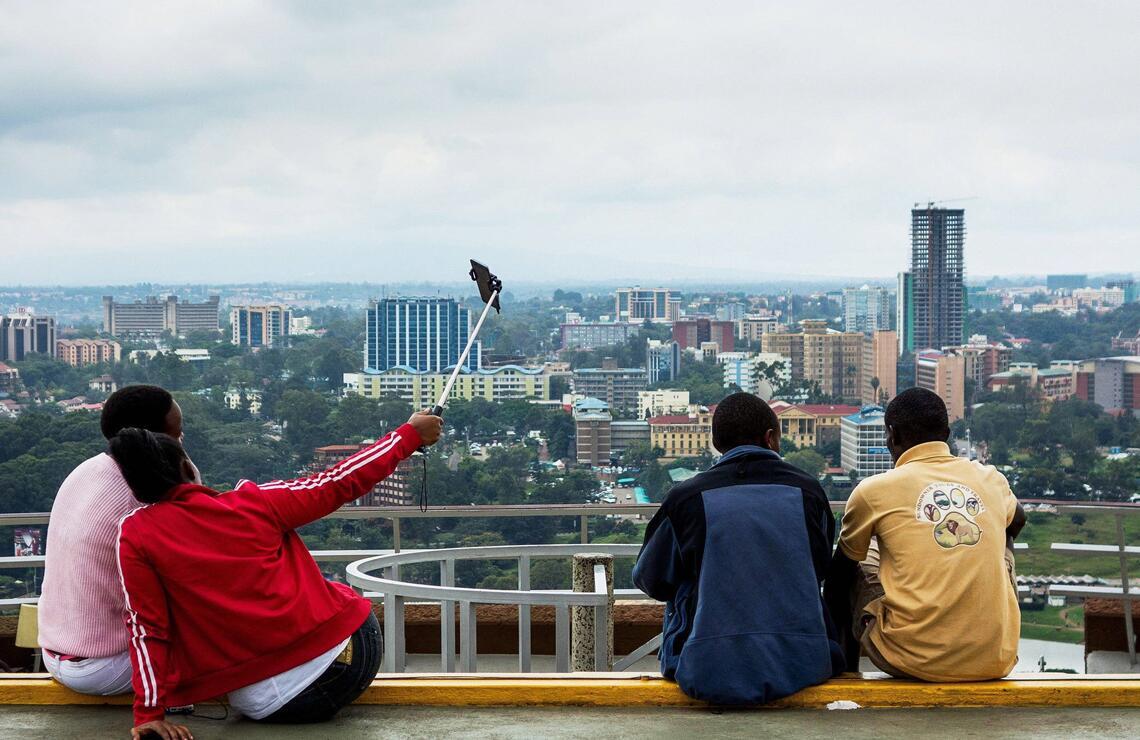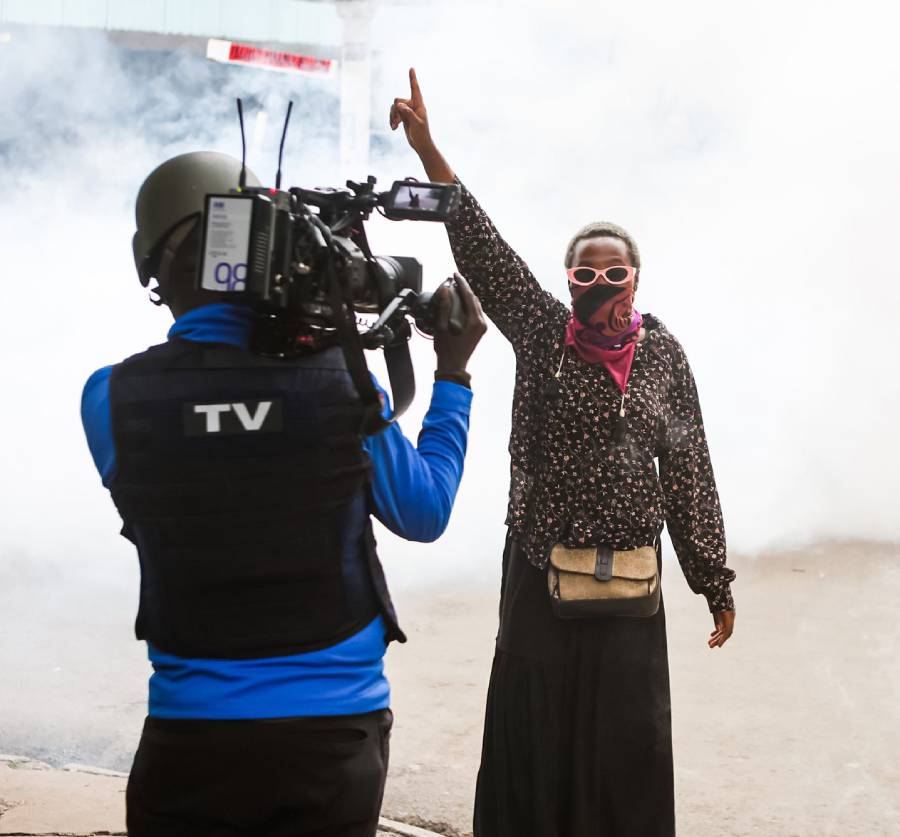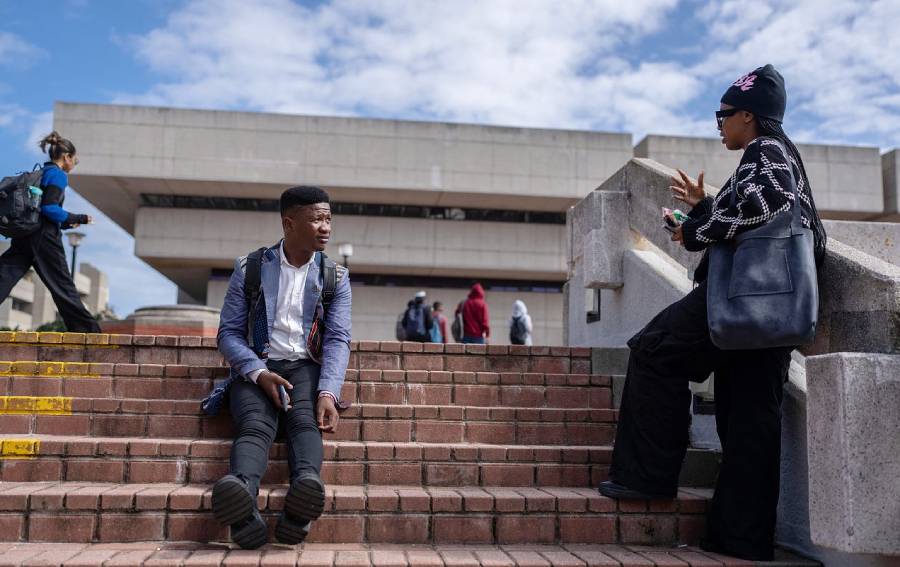
The youth revolution
In Africa, 60% of the population are under 25. Born in the age of social media, they are connected to the world. They need training, jobs and a voice in the political process. Generation Z, frustrated by being all too often forced into unemployment or exile, is becoming aware of its power.
In Kenya, nothing will ever be the same again: on 26 June, after eight days of rioting that left nearly twenty demonstrators dead and more than 300 injured, President William Ruto was forced to abandon his controversial finance bill. Elected in September 2022, Ruto, a self-made man who claims to be the champion of the hustlers (the resourceful people eking out a living in the informal economy), wanted to impose taxes on everyday products - bread, eggs, mobile phone transactions, cars and even female sanitary protection – in order to bring money into the state coffers. On 18 June, the day the bill was due to be debated in Parliament, young people organised themselves on social media – TikTok, X, Instagram – under the hashtag #RejectFinanceBill2024. Kenyans said no to the slashing of their purchasing power, demanding that the government should instead fight corruption and reduce its lavish lifestyle. Young people do not want to foot the bill for the debt, which was exacerbated by the massive infrastructure spending by previous president, Uhuru Kenyatta, and his vice-president, a certain William Ruto.
For the first time, young Kenyans protested beyond any ethnic context: videos, translated into the country's various languages, explained the bill and its impact on household budgets, which are already being battered by inflation. Another distinctive factor was that the demonstrations were organised without the involvement of political parties. Young people seem to have no illusions about political parties, which are seen as interchangeable because of the repeated alliances and betrayals between politicians. Gen Z has risen up, and it's not about to lie down again! “They've killed us, they can't govern us any more”, was how one protester summed it up in a statement to Reuters at the beginning of July. ‘A protest movement the likes of which Africa has never seen’, wrote journalist Charles Onyango-Obbo in regional weekly The East African (6 July 2024), highlighting the alliance between the offspring of the middle and working classes and their parents.
After winning their cause, in July the young Kenyans began asking themselves what they should do next. One thing is certain: they will no longer be silent. Although the Finance Bill was the spark that ignited the worst unrest in the country since the post-election violence in late 2007, it has to be said that the embers had been smouldering for years: Young Kenyans – like young people in many other countries on the continent – are seething with frustration at not being able to make their way in a country where economic growth is failing to keep pace with population growth: Kenya is gaining almost a million new inhabitants a year: 22 million in 1989, 30 in 1999, 40 in 2009, 56 million today... Most African countries are facing the same demographic equation. ‘Progress in public health and education is such that life expectancy is continually on the rise,’ emphasised Lionel Zinsou, economist and former Prime Minister of Benin, in August 2023, in a debate on the French website Vie Publique. ‘The populations of certain Central African countries are currently gaining one year in life expectancy per year.’ In Africa, the median age is 19. Kenyan Gen Z will ‘not be an exception in the 21st century’, writes Onyango-Obbo, who predicts ‘an African reform movement driven by social media’.
A SOCIETAL TSUNAMI
The Kenyan youth uprising is just the latest in a series of socio-political movements that have rocked the continent in recent years, and which are set to continue as young people realise their power and transform it into a tidal wave. The power of this societal tsunami is amplified by the specific characteristics of Generation Z: a connection to the world at large, frustration at the lack of prospects, determination to decide their own future... And demands on those in power.

In Sudan, in April 2019, young people brought down Omar al-Bashir's military-Islamist regime, which had been in power for three decades. In Nigeria, in October 2020, they united against police violence with the #EndSARS movement, named after a notorious squad that had become a symbol of the violence and arrogance of a state incapable of bringing economic and material security to the continent's most populous country, despite the oil bonanza. In Senegal, young people followed Ousmane Sonko and Bassirou Diomaye Faye, two former tax inspectors who promised sovereignty, transparency and integrity through their pan-Africanist party Pastef (Patriotes Africaines du Sénégal pour le Travail, l'Ethique et la Fraternité). These waves have met with mixed results. The ‘old world’ (as the French 'soixante-huitards' of the May 68 civil unrest called the ageing Gaullist regime) has not had its last word. Social media and hashtags alone cannot triumph over the powerful structures put in place since independence, be they political parties or, in Sudan's case, the armed forces. In Khartoum, officers hostile to al-Bashir used the youth uprising to get rid of the late president before cracking down on the protesters (June 2019) and then carrying out a coup (October 2021). A civil war between two armed factions has been ravaging the country for a year and a half. In Nigeria, the rebellious youth of the #EndSARS movement often campaigned in the 2023 presidential election for Labour's Peter Obi, a candidate who promised democratic renewal, but was defeated by veteran politician Bola Tinubu. It was only in Senegal that a mobilised Gen Z was reflected in the ballot box: in April, Bassirou Diomaye Faye was elected president in the first round, appointing Ousmane Sonko prime minister.
PROSPECTS NOT PESSIMISM

The continent's youth should not be seen as a threat or an obstacle, but rather as a strength. Both the United Nations' Agenda 2030 and the African Union's Agenda 2063 agree on the vital role of young people as ‘catalysts for sustainable and transformative governance and development in Africa’, points out the latest report from Afrobarometer, a pan-African network that has been conducting surveys in some 40 countries since 1999. The continent has ‘everything to gain from its young people’, provided that their ‘energy and skills’ are harnessed and that they are given ‘the means and opportunities to contribute to public policy and decision-making’. However, young Africans remain ‘a clear minority in formal governance bodies and in political debate’. Africa ‘is home to the youngest population in the world, but some of the oldest leaders’, due to a ‘combination of obstacles and legal norms’ compromising the active participation of young people. ‘This disconnect translates into governance and policies that do not meet the needs and expectations of young people.’ On the continent, between one-third and two-thirds of young people, depending on the country, are unemployed. A frightening proportion (32%) even admit that they are no longer looking for work... And that goes for 11% of students! These desperate people form the cohorts most likely to take the deadly route of exile, across deserts and seas – a phenomenon nicknamed ‘Japa’ in Nigeria. Or succumb to the siren calls of extremism, as is unfortunately the case with the jihadists in the Sahel and north-east Nigeria. A famous Ivorian proverb sums it up: ‘A dead goat is no longer afraid of the knife’.
This situation is deteriorating. While young Africans are, on average, better educated than their elders (two-thirds have at least secondary education, compared with one-third of those over 56), which is to be welcomed, they are also more likely to find themselves out of work. ‘These young people are increasingly well educated, and therefore less and less attracted by the informal sector or by agriculture’, argues Lionel Zinsou on Vie Publique, adding: ‘In Africa, if you have a school-leavers certificate, you have a chance of being employed, albeit badly, whereas if you have a degree in physics, you have no chance of finding a job commensurate with your qualifications. In addition to being increasingly qualified and educated, young Africans are now more and more connected, and so have a strong awareness of the rights and future they could have elsewhere.’ As a result, they are ‘much more pessimistic than their elders’, Afrobarometer's researchers note, with two-thirds even believing that their country is heading ‘in the wrong direction’.
Young people are therefore immersed in a feeling, at once pervasive and frustrating, of not fitting in. It's a disconnect that is unbearable on a day-to-day basis, and one that can flare up at the slightest moment (police violence in Nigeria, a new tax in Kenya, the arrest of a charismatic opponent in Senegal). Today's young Africans simply refuse to resign themselves to their fate: compared with previous generations, ‘they have less confidence in institutions and politicians’, who are perceived as ‘corrupt’. Unsurprisingly, ‘unemployment’ and ‘managing the economy’ top their list of priorities. Only one in five consider their government to be ‘good at creating jobs’. And while two-thirds of them are ‘attached to democracy’, just as many say they are ‘dissatisfied with the state of democracy’ – to the point where a majority (56%) would be likely to support a coup that would put an end to the abuse of power by elected leaders!
A ‘worrying discovery, given the sheer numbers’ of young people, warn the authors of the survey. This would explain why some young people in the Sahel are attracted to the putschist juntas in Mali, Burkina Faso and Niger. Furthermore, young people are more likely to abstain from voting in elections, and are less active in political parties. On the other hand, they are more inclined to take part in ‘demonstrations and social movements’, which are more loose-knit, often without clearly identifiable leaders, less able than parties and trade unions to negotiate with those in power but, on the contrary, more likely to resort to radicalism, or even violent action. It should also be noted that the demands of these young people are socio-economic (jobs and purchasing power) and transcend the political and ethnic divisions that have done so much damage to the continent in recent decades. At a time when the rise of populism and xenophobia is threatening the foundations of democracy in Europe (RN in France, neo-fascists in Italy, etc.) and the United States (Trump 2), their retreat in Africa, if confirmed, would be cause for satisfaction.
A SENSE OF URGENCY
Satisfying this generation, which makes up today's Africa and will soon represent tomorrow's Africa, requires the engagement of its elders who, in the political and economic spheres, are still in charge. In early July, after yet another tragic boat sinking claimed the lives of 89 would-be exiles, Senegalese Prime Minister Ousmane Sonko appealed to young people: “Your solution is not to be found in dugout canoes”, he declared at the Gaston-Berger University in Saint-Louis. “The future of the world is in Africa... The only continent that still has room for progress and significant growth”, he insisted. “Economic growth far outstrips population growth”, points out Lionel Zinsou, “which in theory means that income can be redistributed.” In theory only: “This growth is essentially capital-intensive, not labour-intensive. African governments invest mainly in sectors that generate few jobs”.
THE IMPERATIVE OF THE AGRICULTURAL, INDUSTRIAL AND DIGITAL REVOLUTIONS

Three job-creating revolutions are needed on the continent. Firstly, an agricultural revolution, to establish food sovereignty, which the Covid-19 pandemic, the climate emergency and the war in Ukraine have made more imperative than ever. ‘With a billion young people, or two billion arms, Africa can easily lift mountains, and in particular transform itself into the granary of the world’, writes former Senegalese foreign minister Cheikh Tidiane Gadio on Vie Publique, scathing of the absurdity of Africa's dependence on wheat and sunflower oil exports ‘from a small European country at war’, Ukraine. Secondly, an industrial revolution: Initiatives in industrialisation and the creation of integrated value chains, which can be seen all over the continent – from Morocco to Côte d'Ivoire, via Ethiopia, Nigeria (the Lekki mega-refinery), or the electric battery factory under construction on the border between the DRC and Zambia, etc. – must be developed and extended. The energy transition and combatting climate change offer a historic opportunity for job-creating, carbon-neutral industrialisation. Lastly, a digital revolution: Zimbabwe's Tatenda Magetsi, founder of Open Mind Initiative Africa, calls for ‘preparing Africa's youth for the digital economy and the jobs of tomorrow’. After all, isn't Africa the continent of leapfrogging, and the pioneer of mobile payments and unbridled creativity?
However, this triple revolution in the African economy, although already underway in some places, will take time – 10 years of work and an investment of twenty billion dollars were needed for the Dangote mega-refinery in Lekki, Nigeria. And yet the impatience of these young people, confronted with the difficulties of everyday life and frustrated at seeing their lives pass them by without any tangible prospects, is boiling over. They only have one life. They are holding their leaders to account. Including those they have just elected with the aim of turning the tables: on 30 June, in Dakar, at the Colobane market, Ousmane Sonko himself was booed by thousands of young people protesting against the police harassment of street vendors.